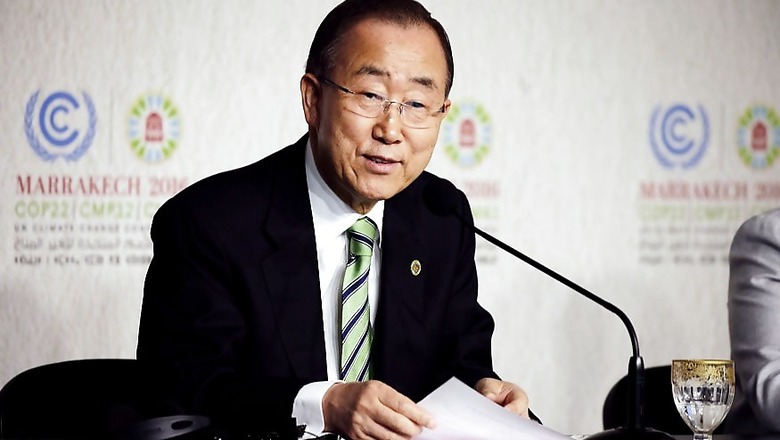
views
New York: U.S. prosecutors on Tuesday accused two relatives of former United Nations Secretary-General Ban Ki-Moon of engaging in a scheme to bribe a Middle Eastern official in connection with the attempted $800 million sale of a building complex in Vietnam.
Joo Hyun Bahn, a real estate broker who is Ban Ki-Moon's nephew, and his father Ban Ki-sang, Ban Ki-moon's brother who was an executive at South Korean construction firm Keangnam Enterprises Co Ltd, were charged in an indictment filed in Manhattan federal court.
The indictment also charged Malcolm Harris, a self-described arts and fashion consultant and blogger, who prosecutors say double-crossed Bahn and his father by holding himself out as an agent of the official only to steal the bribe money.
Bahn, a South Korean national living in New Jersey, pleaded not guilty during a court hearing, where a prosecutor argued unsuccessfully against the 38-year-old's release on a $250,000 bond, calling him a flight risk.
He had been arrested earlier on Tuesday, as was Sang Woo, 35, who prosecutors said participated in the scheme while working at two New York real estate brokerages with Bahn.
Neither Harris, 52, of New York, nor Ban Ki-sang, 69, of Seoul, were arrested, prosecutors said. They could not be immediately reached for comment.
The charges came after Ban Ki-moon stepped down as U.N. Secretary-General on Dec. 31, 2016. A former foreign minister of South Korea, Ban is expected to enter the race to become the country's next president, though he has yet to declare his intention to do so.
Yoon Won-joong, a spokesman for Ban Ki-moon, said he was "surprised" by the reports on the case and had no knowledge of the matter.
LANDMARK 72
According to the indictment, amid a liquidity crisis at Keangnam, Ban Ki-sang arranged for the company to hire his son to broker a refinancing on Landmark 72 in Hanoi, which cost over $1 billion to construct.
In March 2013, Bahn, who had no prior experience with such a deal, through an acquaintance met Harris, who claimed he could help via his connections, which he claimed included members of a Middle Eastern royal family, the indictment said.
Based on communications with Harris, in April 2014, Bahn and Ban Ki-sang agreed to pay an upfront $500,000 bribe and another $2 million upon the sale's closing to an official at the Middle Eastern country's sovereign wealth fund, the indictment said.
But Harris did not have the relationship he claimed with the official, the indictment said, and stole the $500,000, which he spent lavishly, including to rent a luxury penthouse in the Brooklyn neighborhood of Williamsburg.
As Keangnam's liquidity crisis worsened, Bahn - believing the bribe had been paid and would work out - schemed to trick Keangnam and its creditors into believing the sovereign wealth fund was close to acquiring Landmark 72, the indictment said.
But when the deal ultimately failed to materialize, Keangnam entered into court receivership in South Korea, according to court papers.
"MASTER OF DECEIT"
At a court hearing, Assistant U.S. Attorney Daniel Noble urged a federal magistrate judge to deny Bahn bail, saying his South Korean citizenship and "family ties to the diplomatic world" were one of several factors that made him a flight risk.
He also said that after the FBI arrested Bahn in the morning, he made "certain incriminating admissions." Noble did not elaborate, but said the evidence showed Bahn was a "recidivist fraudster" who posed a danger to the community.
"He has shown himself to be a master of deceit," Noble said.
But Julia Gatto, Bahn's court-appointed lawyer, swayed U.S. Magistrate Judge Kevin Fox to grant her client bail.
She noted he had no passport, had lived in the United States for 18 years and had not been back to South Korea since 2002. Gatto said Bahn had been cooperative during his arrest and posed no flight risk.




















Comments
0 comment